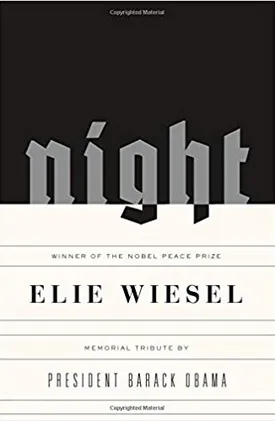Elie Wiesel
Elie Wiesel, born in 1928 and raised in Sighet, Romania, is a critically acclaimed author best known for his works of Holocaust literature, personal commentaries, and advocacy of human rights and worldwide peace. Primarily a Nobel laureate and an advocate for Holocaust remembrance, he is also a humanitarian, political activist, professor, and survivor. Elie Wiesel’s writings, speeches, and works intertwined his personal recollections of an unforgettable experience, the Holocaust, in order to encourage peace and world unity. Throughout his life he was influencing others to stand up for human rights and not be afraid to speak up for what is just.
At the young age of 15, Elie Wiesel and his family were marched off to Auschwitz–Birkenau, a Nazi concentration camp in Poland. At the camp, his mother and younger sister were both killed, while his two older sisters survived. After one year of imprisonment at Auschwitz–Birkenau, Elie Wiesel and his father were transferred to Buchenwald, the largest concentration camp in Germany, where his father soon died. At the camp, Elie Wiesel worked in an “apprentice” program and was able to save some food to share with the other prisoners. Soon after, Elie Wiesel was liberated and returned to Sighet.
Elie Wiesel is an incredibly successful author, and has written more than fifty books, as well as numerous articles and plays. His writings are largely based on his own experience with the Holocaust, and are a testament to the event and its effects. His style is often narrative, as he details his own experience as well as explores his inner emotions and opinion about the event, making his work powerfully emotive. His books are commonly focused on supporting global peace and justice, many exploring human brutality and its manifestations during the Holocaust period.
The most famous work of Elie Wiesel is his 1958 Night trilogy, a personal and powerful account of his experiences in the concentration camps. Divided into three parts, the book explores the horror, suffering, and darkest depravity of the Nazi regime and its effects on the people living under its reign. Night, along with other works, was published in multiple languages, making it accessible to audiences from all over the world. Night has since become a classic of Holocaust literature, included in multiple reading lists and school curricula to portray the full impact of the event.
In addition to his work in literature, Elie Wiesel was highly influential in modern day politics and activism. Since the 1950s, he has been advocating for world peace, vehemently arguing for human rights, taking a stance against oppression, and punishing those responsible for oppressive regimes. In the decades following his camp experiences, Wiesel has held multiple honorary positions, such as chairman of the President’s Commission on the Holocaust and Founding President of the Elie Wiesel Foundation for Humanity.
Elie Wiesel was honored with numerous awards, most predominantly the Nobel Peace prize in 1986 on account of his distinct works of humanity and literature. After a lifetime of humanitarian action and scholarly works, Elie Wiesel passed away in 2016 at the age of 87. He left behind a never-ending legacy, as his works remain a source of inspiration to act out and fight for justice and peace. He serves as a reminder of the dark times that transpired, and an example of how to move forward stronger and humanity.

